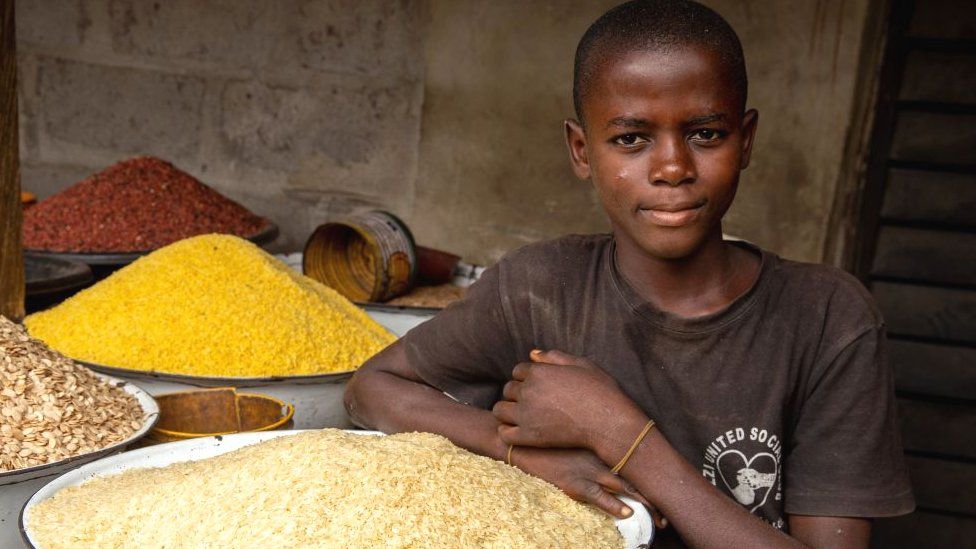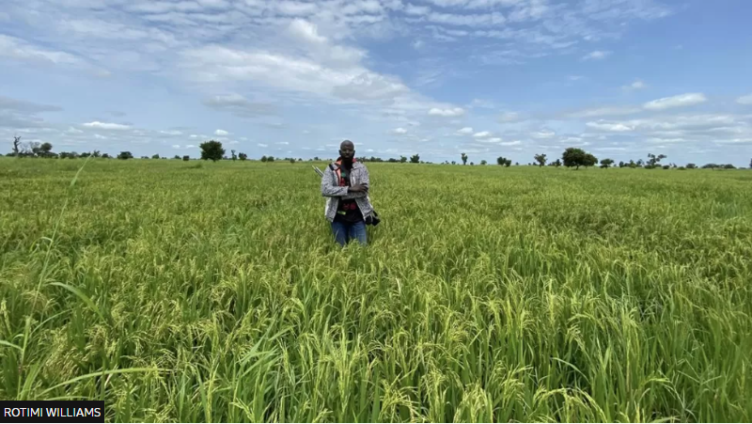In our series of letters from African journalists, writer and novelist Adaobi Tricia Nwaubani looks at why some of those key to boosting agricultural output in Africa's most-populous nation are giving up.

Rotimi Williams was seen as one of Nigeria's most successful rice farmers seven years ago, but now the 42-year-old's land stands idle.
The problem: insecurity, which has ground his farms to a halt.
In 2012, Mr Williams left his career as a banker and ventured into agriculture. He was profiled in international media and described as the second-largest producer of rice in Nigeria, with thriving farms across the north.
But the threat to his life and the lives of his workers grew too much.
"There was a time my car was shot at on my way back from the farm," he said. "There were also kidnap attempts."
In the past three years, a sharp rise in insecurity has led to gangs kidnap hundreds of people for ransom in Nigeria, and staff of prosperous agricultural enterprises have been particularly targeted, forcing many farms to abandon or reduce operations.
More than 350 farmers were kidnapped or killed in the 12 months up to June 2022 alone, according to a Nigerian security tracking website.

The majority of attacks took place in the northern region where there is swathes of uncultivated land and some of the country's largest farms.
In January 2022, five people were killed in an exchange of gunfire between security agents and armed gunmen on motorbikes, gang members known locally as "bandits", who attacked the premises of GB Foods, a tomato-processing plant in the north-western state of Kebbi.
When the multi-million-dollar factory, partly funded by the central bank, had launched to great fanfare in 2020, it was described in the media as Nigeria's second-largest food processing plant and included the country's largest tomato farm.
Bandits then tried to kidnap some of the staff. They failed, but the plant has been out of operation since.
"There's nowhere else in the world where people require armed security to go to the farm," said Mezuo Nwuneli, the managing partner of Sahel Capital.
His agriculture investment firm is in its ninth year of a 10-year contract to invest $66m (£54m) in the farming sector on behalf of the government and its partners, including the UK government and some Dutch investors.
On one of Sahel Capital's farms, a security officer was killed during a kidnapping attempt.
"They used to be comfortable working till 10pm but because of the attack, they don't feel safe to work late. In other parts of the world, you can run a farm 24/7."
'Green revolution'
Prior to the discovery of crude oil in 1956, Nigeria was known for a long list of cash crops, such as palm oil, cocoa, and groundnuts, but the government's focus on the booming oil sector led to the underdevelopment of non-oil sectors, such as agriculture.
This began to change after Olusegun Obasanjo was elected as president in 1999, and made a push to revive agriculture. His government offered farmers improved irrigation as well as new machinery and crop varieties to help boost agricultural productivity.

However, the magic really began to happen when the subsequent administration in 2010 appointed the sleek, bowtie-wearing, charismatic Akinwumi Adesina, as the minister for agriculture.
"When Adesina was minister, he was able to communicate the opportunities in the sector in a way that was exciting for people," said Mr Nwuneli, a graduate of Harvard Business School, who launched Sahel Capital in 2010 when he was 35 years old.
"Around that time, there was a lot of excitement and interest in the youths and the many people coming into the sector at the same time."
The next few years saw the emergence of many young Nigerian agriculture entrepreneurs, like Mr Williams and Mr Nwuneli, in a period that many reports described as Nigeria's "green revolution".
"We had 20 million youths entering the oversaturated workforce from 1990 to 2010. For us, we are committed to unlocking the power of agriculture and job creation with the goal to create 10 million jobs by 2030," said Kola Masha, another Harvard graduate, who founded Babban Gona, which means "Great Farm" in Hausa, in 2010.
His firm uses innovative technology to help its more than 20,000 smallholder maize farmer members to improve crop yields, reduce the cost of production and increase the sale price.
In 2017, Mr Adesina, by then head of the African Development Bank, was awarded the World Food Prize "for driving change in African agriculture" and "his breakthrough achievements as minister of agriculture".
'We lost 300 farms'
All that progress now seems to be unravelling, with nearly 25 million Nigerians at risk of facing hunger between June and August 2023, according to the UN.
"We've lost about 300 farms," said Stella Thomas, who in 2011, at the age of 32, founded Techni Seeds. Based in the north-western city of Kano, the company applies scientific research to produce quality seeds that it then distributes to thousands of farmers across Nigeria, whose work they supervise from planting to harvesting, to ensure maximum yield.
"We call them 'out growers'. We found out that because most farmers use saved seeds - they recycle their seeds - [then] over time, they don't get enough output. So, we give them the seeds that they use, and we are responsible for ensuring that they do the right thing."
The insecurity has forced hundreds of her "out growers" to drop out of the network of supervised farms.
Mr Williams used to enjoy spending months at a time on his farm, organising barbecues for the farmers at the end of a hard day's work, complete with a stereo and loud music.
He is now in the process of moving his rice production to other West African countries, such as The Gambia and Senegal, which also consume rice in large quantities.
His current calculations show that transportation costs would make it unprofitable for him to supply rice to Nigeria from those countries, and he predicts that the rising food inflation in Nigeria will only get worse - if the government continues to slack in its handling of security.
"If there's no security, there's no agriculture," he said. "It's that's simple."
Bola Ahmed Tinubu was sworn in at the end of last month as the new president taking over from Muhammadu Buhari - and the insecurity is his problem to solve.
"We all have hopes that this issue will be dealt with," said Mr Williams, reflecting on the future, "but we will see."
Latest Stories
-
Baltasar Coin becomes first Ghanaian meme coin to hit DEX Screener at $100K market cap
45 minutes -
EC blames re-collation of disputed results on widespread lawlessness by party supporters
59 minutes -
Top 20 Ghanaian songs released in 2024
1 hour -
Beating Messi’s Inter Miami to MLS Cup feels amazing – Joseph Paintsil
2 hours -
NDC administration will reverse all ‘last-minute’ gov’t employee promotions – Asiedu Nketiah
2 hours -
Kudus sights ‘authority and kingship’ for elephant stool celebration
2 hours -
We’ll embrace cutting-edge technologies to address emerging healthcare needs – Prof. Antwi-Kusi
2 hours -
Nana Aba Anamoah, Cwesi Oteng special guests for Philip Nai and Friends’ charity event
2 hours -
Environmental protection officers receive training on how to tackle climate change
2 hours -
CLOGSAG vows to resist partisan appointments in Civil, Local Government Service
4 hours -
Peasant Farmers Association welcomes Mahama’s move to rename Agric Ministry
4 hours -
NDC grateful to chiefs, people of Bono Region -Asiedu Nketia
4 hours -
Ban on smoking in public: FDA engages food service establishments on compliance
4 hours -
Mahama’s administration to consider opening Ghana’s Mission in Budapest
4 hours -
GEPA commits to building robust systems that empower MSMEs
4 hours

